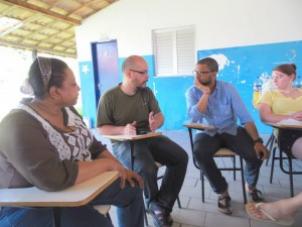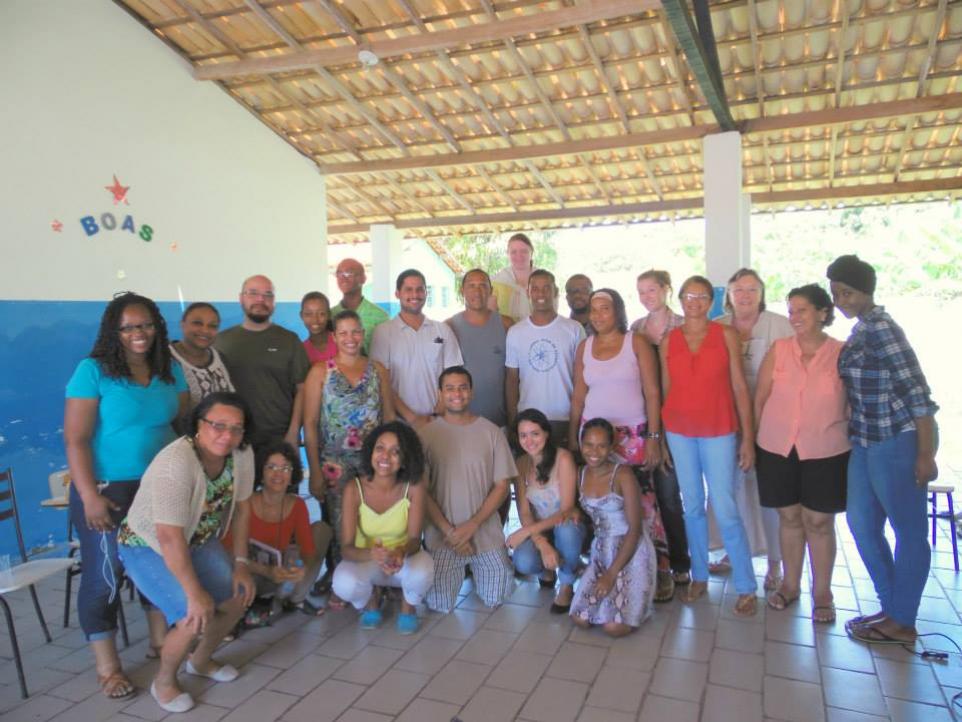Turning Training into Action: Mason Students Analyze a Conflict in Brazil
BS, Sociology, 1969, Oregon State University
MEd, Psychological Foundations of Education, 1971 , University of Florida, Certification to teach psychology at community colleges
Ph.D, Cornell University
M.A, Business
M.S., Conflict Analysis and Resolution 2011, George Mason University
B.S., Political Science, University of Montana
PhD, Conflict Analysis and Resolution, School for Conflict Analysis and Resolution
M.S., Conflict Analysis and Resolution, The School for Conflict Analysis and Resolution (S-CAR)
 |
It’s one thing to study conflict; it’s another to be able to put those studies into practice. Last spring, a team of students and professors from George Mason University’s School for Conflict Analysis and Resolution ventured to Brazil to do just that. Not only did the students have a chance to work firsthand in resolving a conflict, but George Mason’s impact was felt some 4,000 miles away.
Small group discussions focused on overcoming conflicts during training sessions on Brazil’s Matarandiba Island.
First, some background: When rock salt was discovered in the subsoil of the Brazilian island of Matarandiba, off the coast of Salvador, a large chemical company arrived to extract the mineral, in the process buying up nearly 90 percent of the island.
The native fishermen and the rest of the community of fewer than 1,000 found their lives impacted in significant ways. Like any conflict, the challenges in Matarandiba were complex. From issues over land rights, environmental concerns and social identity to project funding and community leadership styles, the island’s residents faced many obstacles. Despite these challenges, Matarandiba is a thriving and close-knit community constantly working to improve daily life.
Last spring about a dozen Mason students and professors spent more than a week with the Economic Solidary Incubator of Technology (ITES)—a program with the Federal University of Bahia—and representatives of social organizations in Matarandiba to conduct training sessions to better address some of these challenges. The field service illustrates Mason’s wide-ranging and robust experiential learning opportunities around the world, and in this case, some of the students learned not just about another country, but about themselves.
Mason’s team was invited to Matarandiba thanks to a relationship K.C. Soares has developed with the Bahia university, where she is a visiting professor. Soares is on the advisory board of Mason’s conflict school.
Mason student Zainab Bakarr Kamara, right, participates in a presentation on active listening.
“Our role was to explore the issues in Matarandiba. That information informed capacity-building workshops in conflict resolution techniques jointly conducted by S-CAR and ITES,” says Cassie Ammen, MS ’11, who works at Mason’s conflict school. When she saw the description of the opportunity, she couldn’t pass it up. “It was an exploratory project to build a partnership [with the Bahia school] and to learn from the impressive community initiatives taking place in Matarandiba.”
“We have a strategic alliance to develop programs together,” Soares says of the two universities 4,000 miles apart. “There are several programs identified and mutually agreed upon which involve both faculties and resources. This field research experience was designed for the students to both apply their conflict analysis and resolution learnings in practice and to work and apply research in another culture.”
Ammen says the team designed skill-building workshops, identified key partners, and trained mediation and community visioning processes, “skills that can enable community members to better assess and handle conflicts when they arise.”
Mason’s team with their Brazilian cohorts after a training session on Matarandiba.
For Mason master’s student Zainab Bakarr Kamara, the trip, paid for by the students, was worth more than the price of a plane ticket. “I stayed after,” she says. “I was born in Germany, but I’m from Sierra Leone and I noticed in Brazil a lot of African influence. I really wanted to learn the culture, really absorb it. But we were really busy the first 10 days, so I stayed on to experience the country.”
While the work was fulfilling—“you could tell there was positive interaction, that what we did there was welcome,” she says—she discovered something about herself that surprised her.
“I felt at home in Brazil,” she says. “It’s a feeling I can’t explain. One of the Bahians told me I am ‘an American with a Bahian spirit.’ That made me feel really good because I had a connection with this place.”
She and Ammen are both hoping a follow-up project to check on progress is in the offing.
This material is presented as the original analysis of analysts at S-CAR and is distributed without profit and for educational purposes. Attribution to the copyright holder is provided whenever available as is a link to the original source. Reproduction of copyrighted material is subject to the requirements of the copyright owner. Visit the original source of this material to determine restrictions before reproducing it. To request the alteration or removal of this material please email [email protected].
rosters
IMPORTANT LINKS
- Home
- Admissions
- Academics
- Research & Practice
- Center for Peacemaking Practice
- Center for the Study of Gender and Conflict
- Center for the Study of Narrative and Conflict Resolution
- Center for World Religions, Diplomacy, and Conflict Resolution
- Indonesia - U.S. Youth Leadership Program
- Dialogue and Difference
- Insight Conflict Resolution Program
- Parents of the Field Project
- Program on History, Memory, and Conflict
- Project on Contentious Politics
- Sudan Task Group
- Undergraduate Experiential Learning Project
- Zones of Peace Survey
- News & Events
- Student and Career Services
- Alumni
- Giving











